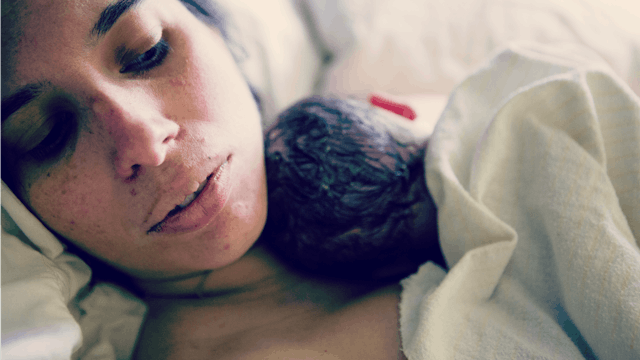How ‘Natural Is Best’ Failed Me

Long before my daughter was even conceived, I already planned how she would enter this world. Her birth would be naturally beautiful. I would labor at home for as long as possible until such time that my husband and I would drive to the hospital in the wee hours of the morning, him frantically speeding, me yelling at him to slow down while catching my breath in between contractions. We’d enter the hospital and be escorted to the labor suite. There, I’d have a perfect, drug-free natural labor and my daughter would make her grand entrance into the world in what would be the most empowering experience of my life.
As so often happens, things didn’t go according to plan.
Facing a 39-week diagnosis of preeclampsia, it was clear that the only way my daughter would be born was through medical intervention. Instead of bouncing on a birth ball, I lay in bed, hooked up to monitors tracking fetal heart rate and my blood pressure. When the decision to induce was made at 1 a.m., after being at the hospital since 4 p.m., I felt dismayed and misled, like something so important was being unceremoniously taken.
Still, she arrived, in full screaming glory, needing her mother and blissfully unaware of my dashed birth plans.
Following her birth, I developed intense postpartum depression (PPD). It was easy to blame so much of my struggle on the fact that my birth didn’t feel empowering, as I’d believed it should. I was supposed to feel like a warrior princess with baby emerging from my feminist loins amidst sheer grit and brute womanly strength, similar to how I’d pushed myself as a distance runner.
I wanted to blame medical personnel for making a hasty diagnosis despite normal blood pressure or for not allowing me to forego monitors or walk around during labor. Medicine didn’t respect my wishes and it was a contributing factor to PPD, or so I readily believed at the time.
Nearly two years later, I have had a massive change of heart. I no longer blame anyone or an institution for stripping empowerment from me, but rather I question my own need for my birth to be empowering, as well as my narrow definition of what empowerment looked like.
There’s an increasingly pervasive ideology today that asserts the following: natural is inherently better, natural birth is empowering, and medical intervention takes away a woman’s right to birthing autonomy. Not only do we see natural is best applied to birth, but it’s also found its way into infant feeding—asserting that breast is best and all good, informed mothers would sacrifice to ensure that their child is exclusively breastfed at all costs. I have come to believe that this way of thinking is not only wrong, but can be more harmful to mothers than the interventions natural birthers claim are the root of labor complications and postpartum depression.
How could I come to abandon my once tightly held beliefs? Maybe my evolution began when my daughter was six days old. My milk had still not come in and she was hungry—having nutritious formula saved her health and my sanity. Or perhaps it was when I, as a military wife alone with an infant and desperate for sleep, realized that attachment parenting wasn’t going to lead to sleeping through the night. Or maybe I was transformed when my OB-GYN handed me a script for Zoloft, affirming that I didn’t have to feel so depleted in what should be a happy time and shared that he was formula-fed.
I started to see that maybe natural isn’t always better, maybe breast isn’t always best, and maybe, just maybe, intervention helps more than it harms.
For those who have never felt influenced by the natural is best ideology, so much of what I’m saying seems obvious. Aren’t all pregnant women’s top priorities having healthy babies and maintaining our own health? Does anyone actually get pregnant just so that they can experience a drug-free natural birth?
Yet, so much of the current culture—from mommy blogs, pregnancy sites, other mothers, even some within the medical community itself—push women toward believing that their objective as new mothers is to have an empowering natural birth and take baby to breast. This influence, I can personally and firmly say, harmed me far more than my interventionist birth and I believe it harms more mothers and babies than we can possibly imagine.
I am currently pregnant with my second and, unlike my daughter’s birth, I have nothing planned except to have a healthy baby. I do not know if I’ll develop preeclampsia again but I am prepared for Pitocin and won’t wait until I’m in agony to request that magical epidural. I don’t know if I’ll be able to breastfeed exclusively—I’ve purchased a new pump that I’ve heard works wonders but I’ll also be stocked up on formula just in case.
What I do know is that I will be going into mothering this new baby free of both internal and external pressure. And should postpartum depression rear its ugly head, it will not be compounded by a prevailing sense of failure because I didn’t birth or feed naturally. It is this new outlook, this freedom from pressure that I have come to define as empowerment.
This article was originally published on